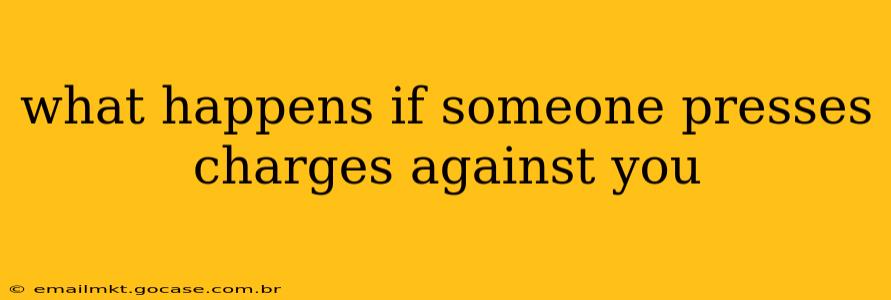What Happens if Someone Presses Charges Against You?
Being accused of a crime and having someone press charges is a serious matter with significant legal ramifications. The process can be complex and varies depending on the nature of the alleged crime, the jurisdiction, and the specifics of the case. This guide will outline the general steps involved, but it's crucial to remember this is not a substitute for legal advice. If you are facing charges, you should immediately consult with a qualified attorney.
What Does "Pressing Charges" Mean?
"Pressing charges" generally refers to the formal process of initiating a criminal case against someone. This usually involves a victim (or in some cases, a witness or law enforcement) filing a complaint with the police or other relevant authorities, detailing the alleged crime and providing evidence. The authorities then investigate the claim, which may lead to an arrest and further legal proceedings. It's important to understand that the police have the authority to pursue charges even if the victim doesn't explicitly "press charges." They will investigate and decide whether sufficient evidence exists to proceed with a prosecution.
What Happens After Charges are Filed?
-
Investigation: Law enforcement agencies will investigate the alleged crime. This involves gathering evidence, interviewing witnesses, and potentially conducting forensic analysis.
-
Arrest (if applicable): If the investigation reveals probable cause—meaning there's enough evidence to suggest a crime was committed and the accused likely committed it—an arrest warrant may be issued. You may be arrested, booked, and potentially held in custody pending a bail hearing.
-
Arraignment: This is your first formal court appearance. You'll be informed of the charges against you, your rights, and you will be asked to enter a plea (guilty, not guilty, or no contest).
-
Bail or Pre-Trial Release: The judge will decide whether to release you before trial, and if so, the conditions of release (bail amount, restrictions on travel or contact with victims, etc.).
-
Discovery: Both the prosecution and the defense exchange information and evidence. This allows each side to build their case and prepare for trial.
-
Plea Bargaining: Many cases resolve through plea bargaining, where the defendant agrees to plead guilty (or no contest) to a lesser charge in exchange for a reduced sentence or other concessions.
-
Trial (if plea bargaining fails): If the case doesn't settle through plea bargaining, it proceeds to trial. A judge or jury will hear evidence and determine guilt or innocence.
-
Sentencing (if convicted): If found guilty, sentencing will occur. The judge will determine the appropriate punishment, which could include fines, probation, community service, jail time, or a combination of these.
What are the Differences Between Civil and Criminal Charges?
It's vital to distinguish between civil and criminal charges. While someone might press charges in a criminal case, they might also file a civil lawsuit seeking monetary compensation for damages. Criminal charges are brought by the state, while civil cases are brought by individuals or entities. A person can be found guilty in a criminal case and be liable in a civil case stemming from the same incident.
What if I am wrongly accused?
If you are wrongly accused, it's crucial to cooperate fully with your attorney, provide any evidence that proves your innocence, and rigorously defend yourself in court. Your attorney will be essential in navigating the legal process and protecting your rights.
How Long Does the Process Take?
The timeframe for a case varies greatly depending on its complexity, the court's docket, and other factors. Some cases might resolve quickly, while others could take months or even years.
This information is for educational purposes only and should not be considered legal advice. The specific procedures and outcomes depend on numerous factors, and the advice of a legal professional is always recommended.
